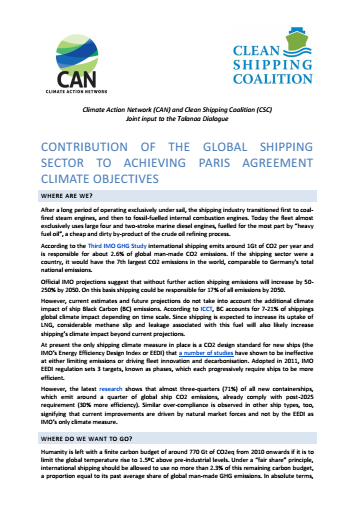Joint CAN-CSC Submission to the Talanoa Dialogue on Shipping, April 2018

If the shipping sector were a country, it would have the 7th largest CO2 emissions in the world. Official IMO projections suggest that without further action shipping emissions will increase by 50-250% by 2050. On this basis shipping could be responsible for 17% of all emissions by 2050. This points to how critical it is for shipping to contribute its fair share towards achievement of the 1.5°C goal. To be in line with the goals of the Paris agreement, annual emissions must be peaked in the immediate future and quickly reduced thereafter.
An important first step in the road to creating a decarbonized fleet is a clear political commitment to do so in an appropriate time frame, meaning absolute emission will have to drop to zero by 2050 at the latest. In addition to agreeing to decarbonise by mid-century, immediate measures will be needed to peak emissions in the short term including regulating ship speed – slow steaming – and strengthening the Energy Efficiency Design Index (EEDI). Following the establishment of short term measures, longer term measures will be needed to establish an effective carbon price for the sector, including a maritime fund. Any ambition gap left behind after the IMO has acted will need to be filled by states, acting either nationally, bilaterally or regionally.
––
Download file: http://can_csc_td_submission_shipping-1.pdf

